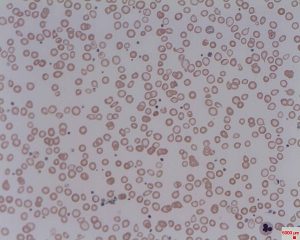The management of patients with anaemia, the risk of cancer and cancer-related anaemia subtypes (PhD)
Start Date Sep 2019
Code A3-I, PhD
Status Ongoing
Anette Tarp Hansen (Aarhus University Hospital)
Introduction
 Anaemia is often a sign of underlying disease and even undiagnosed malignancy. The distinction between anaemia subtypes is clinically important as the different types of anaemia warrant different diagnostic and treatment strategies. Despite the fact that iron deficiency anaemia (IDA) is a recognized risk marker of e.g. gastrointestinal cancer, patients with IDA have been reported to be suboptimal managed. This causes diagnostic delay.
Anaemia is often a sign of underlying disease and even undiagnosed malignancy. The distinction between anaemia subtypes is clinically important as the different types of anaemia warrant different diagnostic and treatment strategies. Despite the fact that iron deficiency anaemia (IDA) is a recognized risk marker of e.g. gastrointestinal cancer, patients with IDA have been reported to be suboptimal managed. This causes diagnostic delay.
Additional knowledge is needed on the cancer risk in patients with different anaemia subtypes. Furthermore, better distinction between different anaemia subtypes and their relation with different cancer types could support the general practitioner (GP) in the diagnostic workup of patients with unexplained anaemia.
Aims & objectives
The overall aim of this project is to increase the knowledge of anaemia subtypes to improve the diagnostic workup of anaemic patients. The project aims:
- To explore the management of patients with selected anaemia subtypes
- To evaluate the risk of cancer in patients with selected subtypes of anaemia
- To investigate the distribution of cancer-related anaemia subtypes in different cancer types
Methodology
The project consists of three individual observational studies, based on Danish national registers and regional laboratory databases, including approximately 230.000 patients aged 40-90 years identified with anaemia based on a blood test from primary or secondary care.
Outputs & impact
This project will provide new insight into the management of patients with different anaemia subtypes, the cancer risk in patients with different anaemia subtypes and the distribution of cancer-related anaemia subtypes in different cancer types. In combination, this will provide important knowledge on how to improve the diagnostic workup of anaemic patients, which could lead to earlier cancer diagnosis and improved survival.
Next steps
We are working on data management on the laboratory data and linking laboratory data to the national registers.
Publications
- Boennelykke A, Jensen H, Østgård LSG, Falborg AZ, Christensen KS, Hansen AT, Emery J, Vedsted P. Insufficient classification of anaemia in general practice: a Danish register-based observational study. Scandinavian Journal of Primary Health Care, 2021. doi:10.1080/02813432.2021.1958499
- Boennelykke A, Jensen H, Zalounina Falborg A, Østgård LSG, Hansen AT, Christensen KS & Vedsted P. Diagnostic workup of cancer in patients with new-onset anaemia: a Danish cohort study in general practice. Scandinavian Journal of Primary Health Care, 2021. doi: 10.1080/02813432.2021.1970934
- Boennelykke A, Jensen H, Østgård LSG, Falborg AZ, Hansen AT, Christensen KS, Vedsted P. Cancer risk in persons with new-onset anaemia: a population-based cohort study in Denmark. BMC Cancer 22, 805 (2022). doi: 10.1186/s12885-022-09912-7


